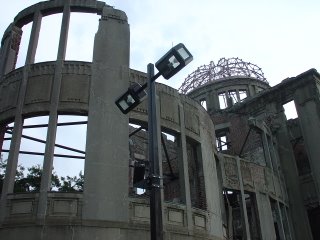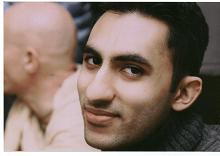My Hotel Room in Kyoto Episode 3 of 3
Here is the shocking conclusion... not to be missed. And in case you haven't figured it out, this is episode 3 of 3 (please please please watch them IN ORDER)...
a blade of grass
… he told me that perfection could be learned from nature. be more humble than a blade of grass; more tolerant than a tree. give respect to others freely, without expectation or motive. in such a state of mind, stripped bare of your false pretenses, call out to your Lord eternally.
i’m still working on it …
i’m still working on it …
2006/08/28
2006/08/25
2006/08/22
What I’m Here For
I usually have a hard time explaining to friends and family precisely what it is that I do. When I was at the D.A.'s office it was a bit easier... most people are somewhat familiar with what prosecutors do (thanks to Law and Order mostly). But what exactly does a communications director do? And once we figure that out, what does a communications director for ISKCON do?
Some think that I'm a P.R. man and that my job is putting a spin on scandals. Others imagine me sitting at the GBC table helping to make epic descisions to rule the Hare Krishna world. And some, I'm sure, think -- as one of my dear friends put it -- I just get paid for being a devotee.
The truth is that at times like this, hanging out in Japanese hotel rooms while "punched in" its sometimes even hard for me to remember what it is that I'm doing here.
Fortunately, Lord Krishna sends reminders. And so it didn't really hit me until the opening session, when I found myself seated in a special section of "delegates" in a huge convention center auditorium. I looked behind me and was stunned: the room was filled with hundreds, possibly thousands of people.

Sitting there, it started to sink in that I'm not here on a holiday or school field trip. This is what I do, this is my job. I am here to come together with other religious leaders, combine resources and ideas, and draft policy that will then be communicated to world leaders and the United Nations in order to stem the forces of war and violence and promote peace. ISKCON has something positive to contribute, and is also benefited by associating with other people of faith who are working towards spiritually informed solutions to the problems of the material world.
As I was handed a headset and given instructions to tune in to various translations being offered, I felt awed by the responsibility. I also felt proud to be here on behalf of Srila Prabhupada. One of my heroes, Srila Prabhupada had the courage to journey west to share Krishna with the rest of the world. He made it clear that he wished to see Krishna consciousness taken seriously by the "intelligent class" of people, world leaders and influential empowered people. Many devotees are working very hard to see that Prabhupada's desire is fulfilled, and it is an honor to assist and serve them.
My mentor, Anuttama Prabhu, gave me priceless advice during my first conference. He told me to always ask myself, in every situation or event, "Why does Krishna want me here? What am I meant to learn?" If I can take that advice to heart, I am confident that the Lord will reveal His plan for me, too. In the mean time, "getting paid to be a devotee" in Japan is a pretty good job to have. :-)
.vbd.
Some think that I'm a P.R. man and that my job is putting a spin on scandals. Others imagine me sitting at the GBC table helping to make epic descisions to rule the Hare Krishna world. And some, I'm sure, think -- as one of my dear friends put it -- I just get paid for being a devotee.
The truth is that at times like this, hanging out in Japanese hotel rooms while "punched in" its sometimes even hard for me to remember what it is that I'm doing here.
Fortunately, Lord Krishna sends reminders. And so it didn't really hit me until the opening session, when I found myself seated in a special section of "delegates" in a huge convention center auditorium. I looked behind me and was stunned: the room was filled with hundreds, possibly thousands of people.

Sitting there, it started to sink in that I'm not here on a holiday or school field trip. This is what I do, this is my job. I am here to come together with other religious leaders, combine resources and ideas, and draft policy that will then be communicated to world leaders and the United Nations in order to stem the forces of war and violence and promote peace. ISKCON has something positive to contribute, and is also benefited by associating with other people of faith who are working towards spiritually informed solutions to the problems of the material world.
As I was handed a headset and given instructions to tune in to various translations being offered, I felt awed by the responsibility. I also felt proud to be here on behalf of Srila Prabhupada. One of my heroes, Srila Prabhupada had the courage to journey west to share Krishna with the rest of the world. He made it clear that he wished to see Krishna consciousness taken seriously by the "intelligent class" of people, world leaders and influential empowered people. Many devotees are working very hard to see that Prabhupada's desire is fulfilled, and it is an honor to assist and serve them.
My mentor, Anuttama Prabhu, gave me priceless advice during my first conference. He told me to always ask myself, in every situation or event, "Why does Krishna want me here? What am I meant to learn?" If I can take that advice to heart, I am confident that the Lord will reveal His plan for me, too. In the mean time, "getting paid to be a devotee" in Japan is a pretty good job to have. :-)
.vbd.
offering prayers in Hiroshima
The prayers I recited were as follows:
harih om
purnam adah purnam idam
purnat purnam udacyate
purnasya purnam adaya
purnam evavasisyate
harih om
svasty astu vishvasya, khalah prasidatam
dhyayantu bhutani, shivam mitho dhiya
manash ca bhadram, bhajatad adhokshaje
aveshyatam no matir, apy ahaituki
trnad api sunicena
taror iva sahisnuna
amanina manadena
kirtaniyah sada harih
om
Hare Krishna Hare Krishna, Krishna Krishna Hare Hare
Hare Rama Hare Rama, Rama Rama Hare Hare
om shanti, shanti, shanti.
purnam adah purnam idam
purnat purnam udacyate
purnasya purnam adaya
purnam evavasisyate
harih om
svasty astu vishvasya, khalah prasidatam
dhyayantu bhutani, shivam mitho dhiya
manash ca bhadram, bhajatad adhokshaje
aveshyatam no matir, apy ahaituki
trnad api sunicena
taror iva sahisnuna
amanina manadena
kirtaniyah sada harih
om
Hare Krishna Hare Krishna, Krishna Krishna Hare Hare
Hare Rama Hare Rama, Rama Rama Hare Hare
om shanti, shanti, shanti.
“The Personality of Godhead is perfect and complete, and because He is completely perfect, all emanations from Him, such as this phenomenal world, are perfectly equipped as complete wholes. Whatever is produced of the complete whole is also complete in itself. Because He is the complete whole, even though so many complete units emanate from Him, He remains the complete balance.” (Isa Upanisada, Invocation)
"May the entire universe be blessed with peace and hope. May everyone driven by envy and enmity become pacified and reconciled. May all living beings develop abiding concern for the welfare of others. May our own hearts and minds be filled with purity and serenity. May all these blessings flow naturally from this supreme benediction: May our attention become spontaneously absorbed in the rapture of pure love unto the transcendent Lord."
(Srimad Bhagavata Purana, Canto 5, Chapter 18, Verse 9)
“Let us aspire to be more humble than the blades of grass, more tolerant than the shade giving trees. Devoid of arrogance, let us offer all respect to others. In such a state of mind, may the Holy Names of God reside on our lips eternally.”
(Sri Siksastakam, Verse 3)
In the name of the Supreme Lord, let there be peace, peace, peace.
2006/08/21
Hiroshima – 5-Star Hotel in the Shadow of Death
Diary of a Traveling VBD - The Japan Files
Day 2: Hiroshima
Day 2: Hiroshima
We got into Hiroshima last night via bullet train, a very fast ride that I mainly slept through. Sleepily wandering into the hotel lobby, I was stunned to see that I would be staying in a virtual palace. My service with ISKCON Commnications has allowed me to stay in various grades of hotels from time to time. But this is perhaps the nicest hotel I've stayed in. The hotel boasts everything from a gym and salon to an indoor mall and wedding banquet halls. As I took it all in, I started wishing for some time to relax at the hotel -- although looking at the conference schedule, that doesn't seem very likely. Anyway, at least I could enjoy the gorgeous view from my 22nd Floor room:

Hiroshima seems to be a beautiful city.... with greenery, modern buildings, and traditional Japanese structures all co-existing. Its too eay to forget that 61 years ago, the United States dropped the world's first atomic bomb on this same spot, decimating every building to ashes, killing and injuring thousands and thousands. Somehow, the Japanese people were able to recover and rebuild this city. It is amazing enough that a single tree or blade of grass was able to grow here -- let alone the whole parks full of lush vegetation that now marks the spot where the A-Bomb was dropped.
Taking a short walk from the hotel, I found myself face to face with an odd looking structure that resembled the skleleton of a domed building. I soon learned that this structure is the A-Bomb Memorial, a building that miraculosuly survived the blast.

It was hard not to let my mind drift to the irony that here I was staying in a hotel designed to gratify every one of my senses to no end, and yet was only steps away from an undeniable testament to the destruction and misery that is possible in this world. Luxuries pamper us and help us to forget the reality of this material world: that it is a place of birth, old age, disease, and ultimately death. Does saying that make me pessimistic? Maybe. Its hard not to be pessimistic when you realize you are standing on land that was the scene of indescribable violence only 6 decades ago. Or maybe its just being realistic... looking beneath the surface of the hotel with all its artficial niceties, and confronting the scary things we don't want to talk about.
Its humbling, and sobering. But I will probably forget it soon enough, distracted by whatever else comes my way. The acaryas describe this tendency as "funeral renunciation" -- the tendency to become very serious about one's spiritual life at the funeral, but then to get covered over again. For now, though, I'm trying to keep focused.
Hare Krishna.
Sarkar in a hotel room
Traveling a lot, I'm beginning to find, means going to sleep in different beds and at different times. One particularly disturbing feling is waking up in a hotel room and not knowing where -- what country, city, or room -- you are in. Its happened to me more than once.
Still, sometimes I have little problem with this, sleeping like a log wherever I happen to lay down. Other times, I toss and turn and experience insomnia. My first night in Hiroshima fit into category #2. As much as I tried, I just couldn't get to sleep.
Q: What do you do when you can't fall asleep in a Japanese hotel room?
A: You watch Sarkar, Ram Gopal Varma's Bollywood remake of The Godfather, on DVD.
For those who haven't seen it, the movie stars Amitabh as a Bal-Thakeray-esque self-acclaimed don who rules Mumbai behind the scenes, and Abhishek as his conflicted son. From a critic's point of view, the film was okay -- horrible writing, a mediocre adptation of an American film classic, sloppy in many places. But Amitabh wears a black dhoti, Abhishek reminds us why he's the guy that girls want and guys want to be like, and the film has a scene with pujaris shooting someone with guns hidden under the cloth that covers the offering plates. Enough said.
By the time I had finished the film it was already close to 2:00 am, and I was hardly any sleepier. But I did manage to take this picture of Amitabh on my screen:

Govinda. Govinda. Govinda.
Still, sometimes I have little problem with this, sleeping like a log wherever I happen to lay down. Other times, I toss and turn and experience insomnia. My first night in Hiroshima fit into category #2. As much as I tried, I just couldn't get to sleep.
Q: What do you do when you can't fall asleep in a Japanese hotel room?
A: You watch Sarkar, Ram Gopal Varma's Bollywood remake of The Godfather, on DVD.
For those who haven't seen it, the movie stars Amitabh as a Bal-Thakeray-esque self-acclaimed don who rules Mumbai behind the scenes, and Abhishek as his conflicted son. From a critic's point of view, the film was okay -- horrible writing, a mediocre adptation of an American film classic, sloppy in many places. But Amitabh wears a black dhoti, Abhishek reminds us why he's the guy that girls want and guys want to be like, and the film has a scene with pujaris shooting someone with guns hidden under the cloth that covers the offering plates. Enough said.
By the time I had finished the film it was already close to 2:00 am, and I was hardly any sleepier. But I did manage to take this picture of Amitabh on my screen:

Govinda. Govinda. Govinda.
Turntables and Food (more pix from Japan)
At a music instrument store, I got to sample the latest DJ equipment, including an amazing Technics CD turntable. I spent 30 minutes scratching, looping, and re-living my DJ college days. Because the Japanese are unbelievably polite, nobody bothered me, and a small crowd of Japanese children even gathered around me like I was a superstar!
But all that Dj'ing made me hungry. So, I head to the food court -- an impressive gallery full of Japanese and wannabe-American fast food.
Unfortunately Japanese food seems to favor meat, fish, and eggs without exception. A common dish is a mass of colorful noodles and seafood with a large sunny-side egg draped on top of it.
Funny T-shirts in Japan
A lot of Japanese people wear funky t-shirts that say random English phrases. For a people who don’t speak English much, they sure do love to wear it! Here are some gems I was able to snap some shots of. (Click on each one for a better view)
2006/08/20
The Japan Diaries: Day 1
Diary of a Traveling VBD: Day 1 in Japan
While I am on a 10-day business trip to Japan, attending the World Assembly organized by Religions for Peace, a powerful interreligious NGO.
I’m writing this from the famous Japan “bullet train,” which is carrying me and my Religions for Peace colleagues from Osaka to Hiroshima. A 5 hour drive, the “super-express” (which is what the Japanese call the bullet) gets us there in 2.5.
This morning, I imagined that I’d spend my first full day in Japan exploring ancient temples or photographing coy ponds. Instead, I had a day at Woodbury Commons.
Backtracking… after an uneventful plane journey from New York to Chicago and then on to Osaka, I landed up in Japan at 5:00pm yesterday (Japan time). As soon as I stepped off the plane, I was struck by how similar it felt to being in India. That same wall of thick, humid air that smacks into you when you step out, that same distinctively un-American glow that other airports seem to emanate. After exchanging dollars into yen (I figured out an easy way to convert – you take the yen amount and move the decimal two spaces to the left and that is the dollar amount, approximately), I got on a shuttle van to my hotel for a night. Osaka Kansai airport, supposedly the world’s biggest, is actually on a man-made island that includes a mall, hotels, and an observatory. As the van drove across a bridge towards the city of Osaka, I took in the beautiful view of the seaside town at near-sunset. The scenery and salty sea air reminded me a bit of Mumbai, specifically Marine Drive, and a brief wave of nostalgia washed over me. Before I could dwell on it too long, though, we were navigating our way through small alley ways and twisty roads, until we finally arrived to my hotel. The room was small, clean, and quite comfortable, and made for a decent place to spend a night.
This morning, after a shower and breakfast of Nurti-grain bars and crackers (thanks Krsangi!) I tried to plan out my day. Originally, I had welcomed the opportunity to have some down-time and had daydreamed about going for some sightseeing, chanting japa in a park, doing some writing, or catching up on emails. Unfortunately, though, yesterday the hotel concierge told me (in broken English) that I had to check-out by 11am. Since I had to meet my group at 4pm at the airport, that left 5 hours to fill without a home base. I checked out at 11am and tried to ask for some suggestions from the hotel staff of what to do.
Surprisngly, my stay in Osaka has taught me that most of the Japanese people I encountered don’t speak a word of English. Shocking, considering that in India just about everyone – even the common riskshwalla or dhobi – can at least manage some tooti-pooti Angrezu phrases. Not so in Japan.
The hotel staff proved to be particularly non-lingual. Somehow they managed to communicate to me that a cab ride anywhere with anything to do would cost me at least 4000 Yen (read: $40). But, they offered, a free hotel shuttle could take me to the nearby outlet mall. From the mall, the airport (where I was meeting up with the others) was a short public bus ride. Another plus point: the outlet could rent me a locker to stow away my two big bulky suitcases while I spent my day. Although I hadn’t planned on it, it made too much sense to turn down, so I boarded the shuttle and within twenty minutes found myself in…
… Woodbury Commons outlet mall. Okay, so it wasn’t called that. But it might as well have been. The same developer made this place (a world map showed locations of replicas all across the globe, including Woodbury), and apparently they like them to look uniform. It felt surreal, but there I was – walking along the rows and rows of stores, a lone brown face in a sea of Japanese teens and families.

The Japanese are extremely fashionable people. Nearly everyone was decked out in designer gear. Many of the men sported punk rock haircuts and vintage retro chic clothes, while their ladies opted for form fitting designer outfits and highlighted bone straight hair. I’ve yet to see a young Japanese woman who weighs more than 100 pounds. Also, I’m not sure why Japanese people are said to be “yellow” – they look more white to me, literally, than so-called white people (who should be perhaps called “peach”). Anyway, I spent the next few hours embracing Japanese culture – such historical locations as the Gap, Kate Spade, Armani, Versace, Eddie Bauer, and Nautica. After doing the customary price conversions (“Wow, this Guess sweater is 9,000 Y – wait, that’s $90 just like it is in the U.S.”), the novelty of going outlet shopping in Osaka wore off.
Soon I was hungry (24 hours had almost passed since my last meal on the plane, and I had been surviving on crackers and granola bars). Different devotees have different standards about their eating while traveling. Although at home I make it a point to not eat out frequently, and to only eat at vegetarian restaurants if I do eat out, while abroad this is not always so easy. Krsangi had done some internet research on vegetarian restaurants before I left, but both of the only two veg places in Osaka were closed today (it being Sunday). So, I decided to give the mall's food court a try. Unfortunately Japanese food seems to favor meat, fish, and eggs without exception. Desperate, I finally found a high-end Italian restaurant that seemed clean, had English speaking staff, and served a freshly made Margherita pizza. With my Japanese tour guide book, I was able to express myself (the Japanese word for vegetarian, believe it or not, is “bejiteran”). The pizza – a simple concoction of thin crust, mozzarella cheese, fresh tomatoes, and basil leaves – hit the spot.
And so, after spending my first Japanese day looking at American stores in a mall and eating pizza, I took a short bus ride back to the airport, where I met up with other Religion for Peace members. Together, the 14 of us boarded the train for a 2.5 hour to Hiroshima. And here I am, typing this in Word. I will cut and paste this once I can get online, and will try to write some more from the hotel in Hiroshima tomorrow.
Sionara!
Ys,
VBD
Subscribe to:
Comments (Atom)









